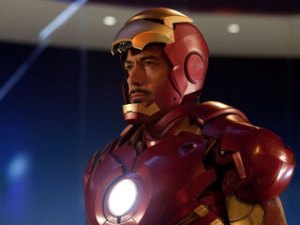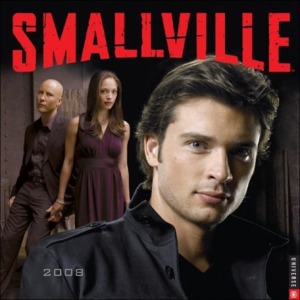 Iron Man 2 opens tonight, and if you’re like me, you really, REALLY want to go see it. There’s just something about a good comic book movie that gets the little kid in me juiced, makes me feel excited and anxious to get to the local infini-plex and load up on Coke and popcorn as well as those little fruit thingys that stick to your teeth and strike obnoxious talkers in the head with ferocious accuracy.
Iron Man 2 opens tonight, and if you’re like me, you really, REALLY want to go see it. There’s just something about a good comic book movie that gets the little kid in me juiced, makes me feel excited and anxious to get to the local infini-plex and load up on Coke and popcorn as well as those little fruit thingys that stick to your teeth and strike obnoxious talkers in the head with ferocious accuracy.
In other words, I’m geeked. Because I’m a geek.
But after reading the review from Entertainment Weekly for Iron Man 2, I’m less enthused. Not because I allow critics to form my opinion on movies (I mean honestly, I can almost say with 100% confidence that if a critic loves a movie, I’m invariably going to hate it. My friend Ashton says that’s because I’m an entertainer at heart and therefore like stories that entertain; he juxtaposes this against the artistic at heart, who like stories for the stories themselves, regardless of whether or not anyone else likes them. He also makes a convincing corrollary between being artistic and being necessarily tortured in soul, but I digress).
Where was I? Oh – I don’t let critics influence my opinion on movies, but the EW review detailed that the movie focuses less on the character of Tony Stark (Robert Downey Jr. in a role he just owns) and his struggles with being a hero and instead turns the lens to more and bigger battle scenes. Which, I’m cool with, but not at the expense of character.
In other words, what could have been a potentially unique look into the heart and mind of a superhero (because, let’s face it, Iron Man is not about brooding introspection a la The Dark Knight, nor is it as existentially angst-ish as the Spider-Man franchise) becomes – in the opinion of the reviewer – just another shoot-em-up SFX fest.
This, to me, is troubling. Not because I dislike a good shoot-em-up SFX fest – I love a good one, and honestly: who doesn’t? – rather I find it disturbing that we no longer like to know what makes our heroes tick. In essence, we want a superhero who does superhero things in the appropriate amount of time with the appropriate (and ever increasing) amount of bang, and we want to walk away saying, “That was a good superhero movie.”
But what makes a superhero heroic is not just the ability to blow sh*t up. Nor is it the superhero’s ability to get into his suit of armor or tights. What makes a good superhero is the combination of story with ability. The struggle of the man or woman with his or her self, both in and out of costume.
We’ve lost the patience for that kind of thing, it seems.
 I’m a superhero kind of guy, provided the superhero is done right. At least in my estimation. I don’t generally gravitate toward the superheroes who operate under a “scorched earth” policy – faster, Kick-Ass, kill, kill, kill! – as those characters are more about anti-heroes than actual heroism. I don’t think you can be heroic without an essential sense of virtue and morality, and being vengeance minded doesn’t count as moral in my book. Now, if the hero starts with a vengeance mindset (like, say, Batman) but moves toward a larger morality, that’s cool. But a superhero who just kicks tail and kills folks because the world sucks doesn’t get my vote or my interest.
I’m a superhero kind of guy, provided the superhero is done right. At least in my estimation. I don’t generally gravitate toward the superheroes who operate under a “scorched earth” policy – faster, Kick-Ass, kill, kill, kill! – as those characters are more about anti-heroes than actual heroism. I don’t think you can be heroic without an essential sense of virtue and morality, and being vengeance minded doesn’t count as moral in my book. Now, if the hero starts with a vengeance mindset (like, say, Batman) but moves toward a larger morality, that’s cool. But a superhero who just kicks tail and kills folks because the world sucks doesn’t get my vote or my interest.
And yet, there seems to be a plethora (“Do you even know what that word means?” “No, El Guapo!”) of movies and comics and graphic novels out there that suggest this as the dominant superhero archetype now. Maybe it’s a response to our own developing sense of frustration, maybe it’s reflecting the erosion of a true moral code, or maybe it’s just because we’ve become a violent society feeding on violence for violence’s sake (shades of gladiatorial Rome, perhaps). But it does not bode well for the superhero myth.
I read a blogpost about why Superman will always suck, and one of the key issues the author takes with Supes is his “moral absolutism. ” And in a postmodern, relativistic world, I can understand the argument. But the problem is, while it is true and real that flawed and imperfect heroes exist and therefore occasionally – if not often -fail, the superhero by nature is not real. The superhero is not Joe Schmuck next door. He or she is an individual gifted beyond our limitations, beyond our ability to be. That’s what makes him or her super.
 But we’re not satisfied with the “transcendent hero” anymore. In fact, we seem to resent the sh*t out of him, as if by merely existing we are somehow diminished for not being like him. And since the superhero is a created being, the easiest way to deal with our metaphysical discomfort is to just kill the archetype off.
But we’re not satisfied with the “transcendent hero” anymore. In fact, we seem to resent the sh*t out of him, as if by merely existing we are somehow diminished for not being like him. And since the superhero is a created being, the easiest way to deal with our metaphysical discomfort is to just kill the archetype off.
That sounds harsh though, so to be fully capable of pulling that off in front of a public consciousness that still thinks it needs heroes, we’ll brand the archetypal holocaust a “re-imagining.” See the re-boots of the Superman, Batman, Spider-Man franchises in print and on film. I mean, my God, life is not normal if we don’t somehow see at least one comic hero/heroine and their universe razed, taken back to ground zero, and rebuilt in our own, current image. We add in quirks or obvious flaws (drunkeness seems to be popular, as is depression, repression, opression, obsession, regression and Grecian 44) that keep the hero from being seen as truly good, and then we watch the hero struggle with the burden of heroism for however many issues it takes us to get bored with his endless struggles. Then we b*tch and moan because he’s depressing and not really all that heroic, and the universe gets collapsed, the process started all over again.
Perhaps it’s just a good business model. But it feels like more.
Don’t get me wrong. I believe a static hero is difficult to pull off without him or her becoming anachronistic. Superman being the prime example of this. I currently watch Smallville with my wife, and I’ve grown increasingly tired of the show because Clark has become static. He’s not moving forward in his character. He’s stuck in an interminable “inbetween” phase that has gone on for far too long. It makes him seem naive, stupid, unsympathetic, and worst of all selfish. It is the mirror world of the real Superman, who is wise, intelligent, inviting and genuinely interested in the good of all people.
 Now, I’m aware that the archetype for Superman has it’s limitations. But the character has sustained for over seventy years – that’s right, SEVENTY FRICKING YEARS – based on the character’s character: a sense of morality, a desire for justice, and the belief that those with power should serve those who are powerless. Those are not static characteristics, and they sure as hell aren’t boring. Yes, I know the challenge of stretching Superman is hard, but difficulty has its rewards. But rather than delve into a full working out of what true goodness looks like in a fallen world (and make no mistake, the comic book world is as fallen as it can be), our generation shirks the challenge, choosing to denegrate the hero’s character rather than elevate our own. It comes back to my theory of conviction: we see in the true superhero our failures, rather than his example.
Now, I’m aware that the archetype for Superman has it’s limitations. But the character has sustained for over seventy years – that’s right, SEVENTY FRICKING YEARS – based on the character’s character: a sense of morality, a desire for justice, and the belief that those with power should serve those who are powerless. Those are not static characteristics, and they sure as hell aren’t boring. Yes, I know the challenge of stretching Superman is hard, but difficulty has its rewards. But rather than delve into a full working out of what true goodness looks like in a fallen world (and make no mistake, the comic book world is as fallen as it can be), our generation shirks the challenge, choosing to denegrate the hero’s character rather than elevate our own. It comes back to my theory of conviction: we see in the true superhero our failures, rather than his example.
Which brings me back to my blog title, and the question I’m wrestling with: Do we still need superheroes?
If we’re talking about superheroes who are heroic, transcendent in their moral bearing, character, motives and interactions, then I say a resounding “Hell, yeah we do. More than ever.”
But if we’re talking about superheroes who are made in our own image, who take the things we don’t understand or care to change about ourselves and magnify them into traits that are supposed to be admirable, that don’t call us to a higher standard of life or thought or belief, superheroes who condescend and pull us down with them, the answer is equally resounding.
No thank you. Period.
And if you’re wondering just what sort of superhero story I’d like to read, head here, read the “Batman: In the Cards” postings (1, 2, 3), and find out for yourself.
